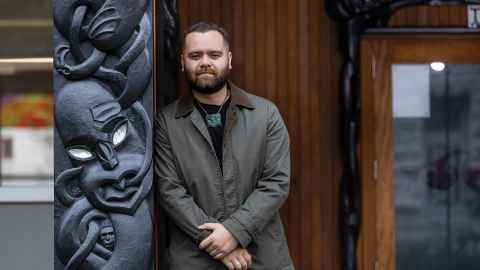The te reo Māori custodian
1 September 2025
Robbie Pāora grew up steeped in his language and culture – a path he continues to walk in his mahi as the University’s kaitiaki reo Māori.

Raised on his Ngāti Whātua marae of Rēweti and Ōrākei, Robbie Pāora grew up around his elders and with te reo Māori as his first language.
Aged just one year apart, he and his sister Majic were homeschooled and primarily ranged between Rēweti in Waimauku and the four other Ngāti Whātua marae in the southern Kaipara area.
“I was blessed,” says Robbie. “Today, those times have passed. Our culture is thriving a little more, but the old ways are gone – the old people, the old type of language.”
That upbringing, steeped in Māori language and culture, established the path for his mahi, which today includes being the University’s kaitiaki reo Māori in the Office of the Pro Vice-Chancellor Māori.
Robbie was the first to take on the role at the University when he began in early 2024, and it’s broad ranging.
He oversees the University’s plan for the revitalisation of te reo Māori, ‘Te taonga nō tua whakarere, he taonga mo āpōpō’ (‘A treasure from ancient times, and for tomorrow’). The inaugural plan covered the years 2020 to 2025 and its first update will be released later this year.
The language plan, he says, helps guide aspects of his job – such as the te reo Māori naming of buildings, initiatives and job titles across the University – to ensure they’re underpinned by guiding philosophies. Finding appropriate names for the kind of novel and boundary-pushing work that is undertaken at the University, he says, “always keeps me on my toes”.
I got into reading everything I could about Māori linguistics and grammar and it changed my whole view of the language.
He also oversees resources related to the language plan, such as Kuputaka – the glossary of terms and style guide for te reo Māori – and the Te Kūaha language resources app.
Alongside Honorary Associate Professor of Sociology Dr Avril Bell, he leads the eight-week professional development course Te Akoranga Kairangi; he covers the course’s te reo Māori and tikanga content, with Avril covering the history of Māori/Pākehā relations. Kura Taumata Rau is another language and culture wānanga for staff that he runs, and he also guides City Campus history walks.
Language teaching is a passion. In 2015 he began what ultimately became a five-year role teaching te reo Māori, from beginner to full-immersion levels, at the Dunedin campus of Te Wananga o Aotearoa. With te reo Māori as his first language he had the fluency required for teaching, he says, but initially lacked a technical understanding of the language.
“A lot of tauira [students] would ask why something was the way it was, and I would say, ‘it’s just how it is’, but it wasn’t good enough,” he recalls. “So, I got into reading everything I could about Māori linguistics and grammar and it changed my whole view of the language. I was able to mould my more traditional style into something more technical, which really helps when you’re teaching to a curriculum.”
Robbie’s University role is half time, which he also balances with responsibilities he carries in his iwi. Mostly related to heritage preservation, these encompass teaching history and te reo Māori, naming and opening buildings across the city, and playing a role in annual events, such as Matariki and Waitangi Day (the latter marked on 20 March, when Ngāti Whātua signed the Treaty).
The spotlight that shines brightly on te reo Māori in the month of September, with events such as Te Wiki o Te Reo Māori and Mahuru Māori, comes with some sense of tension, he says; for many whose life and work is embedded in the language, it would be ideal for that spotlight to shine year-round. Still, as the guardian of te reo Māori on campus, it’s a busy time.
“People around the University are reaching out about events they’re organising and they go into our calendar. Then it’s just a matter of being there to support and saying, ‘How can I help?’”
- Caitlin Sykes
This article first appeared in the September 2025 issue of UniNews.